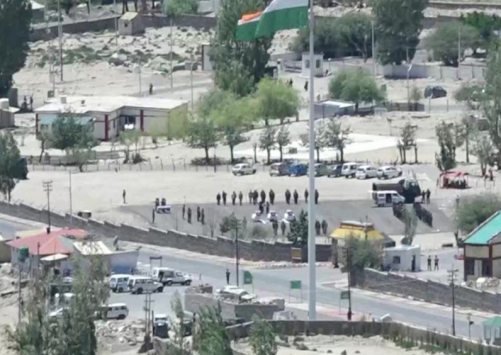China, India agree to de-escalate
China and India have agreed to de-escalate the situation at their border as soon as possible following a clash between their troops, the Chinese foreign ministry said yesterday. Senior Chinese diplomat Wang Yi and Indian Foreign minister Subrahmanyam Jaishankar during a phone call agreed that “both sides would implement disengagement understanding of 6 June sincerely.”
They also stressed: “Neither side would take any action to escalate matters and ensure peace as per bilateral agreements & protocols.” Wang Yi also told India to severely punish those responsible for the conflict and control its frontline troops, the Chinese ministry said in a statement. China and India have blamed each other for the clash on Monday.
India’s Jaishankar earlier said this unprecedented development will have a serious impact on the bilateral relationship. “The need of the hour was for the Chinese side to reassess its actions and take corrective steps.”
He also blamed China for aggravating the situation, saying, “What happened in Galwan was premeditated and planned action by China which was responsible for the sequence of events.” Reports said that soldiers of the two sides savagely fought each other with nail-studded clubs and stones killing at least 20 troops on Indian side and left 45 either dead or injured on the Chinese side.
“We never provoke anyone,” Prime Minister Narendra Modi said on national television, referring to Monday’s hand-to-hand fighting. “There should be no doubt that India wants peace, but if provoked, India will provide an appropriate response.” “I would like to assure the nation that the sacrifice of our jawans will not be in vain.
For us, the unity and sovereignty of the country is the most important...India wants peace but it is capable to give a befitting reply if instigated.” Russia welcomes talks Russian Foreign Minister Sergey Lavrov welcomed the talks between military representatives of India and China.
“We welcome all steps aimed at de-escalation at the Line of Actual Control (LAC), including the conversation between the two Foreign Ministers, and remain optimistic,” said Nikolay Kudashev, Ambassador of Russia to India. He added: “The existence of the RIC (Russia-India-China) is an indisputable reality, firmly fixed on the world map.
As for the current stage of the trilateral cooperation, there are no indications that it might be frozen.” In Beijing, foreign ministry spokesman Zhao Lijian said the clash erupted after Indian soldiers “crossed the line, acted illegally, provoked and attacked the Chinese, resulting in both sides engaging in serious physical conflict and injury and death”.
He said he did not know of any Chinese casualties. Zhao said the overall situation at the border was stable and controllable. Under an old agreement between the two nuclear-armed Asian giants, no shots are fired at the border, but there have been fisticuffs in recent years between border patrols.
According to Indian officials, soldiers were hit with clubs studded with nails and stones during a brawl that erupted in the remote Galwan Valley, high in the mountains where India’s Ladakh region borders the Aksai Chin region captured by China during the 1962 war. The rival armies have been eyeball-to-eyeball at their border for decades, but it was the worst clash since 1967, five years.
‘Enough is Enough’ Rahul Gandhi, leader of the opposition Congress party tweeted: “Enough is enough, We need to know what happened. How dare China kill our soldiers, how dare they take our land.” Hundreds of Indian and Chinese troops have been facing each other since early May at three or four locations on the disputed border in the uninhabited, barren mountains of Ladakh.
India says Chinese troops have intruded into its side of the Line of Actual Control or the de facto border. China rejects the allegation and has asked India not to build roads in the area, claiming it to be its territory. According to the Indian government sources, the fighting on Monday night broke out during a meeting to discuss ways to de-escalate tensions, and the colonel commanding the Indian side was one of the first to be struck and killed.
Colonel killed Many of the other Indian soldiers who died had succumbed to their wounds, having been unable to survive the night in freezing temperatures. Unlike in India, the incident did not receive wall-to-wall coverage in China, where official media reported a statement on the incident from the spokesperson for the Chinese army’s Western Command.
On social media, bloggers and media aggregating platforms shared Indian media reports, such as the Indian army’s announcement acknowledging that the death toll had risen to 20. Most vocal was the Global Times, a paper published by the official paper of the country’s ruling Communist Party. Its editor-in-chief, Hu Xijin, took to domestic and global social media platforms to scold India, saying “Indian public opinion needs to stay sober” and to warn that China did not fear a clash.
Related Posts

